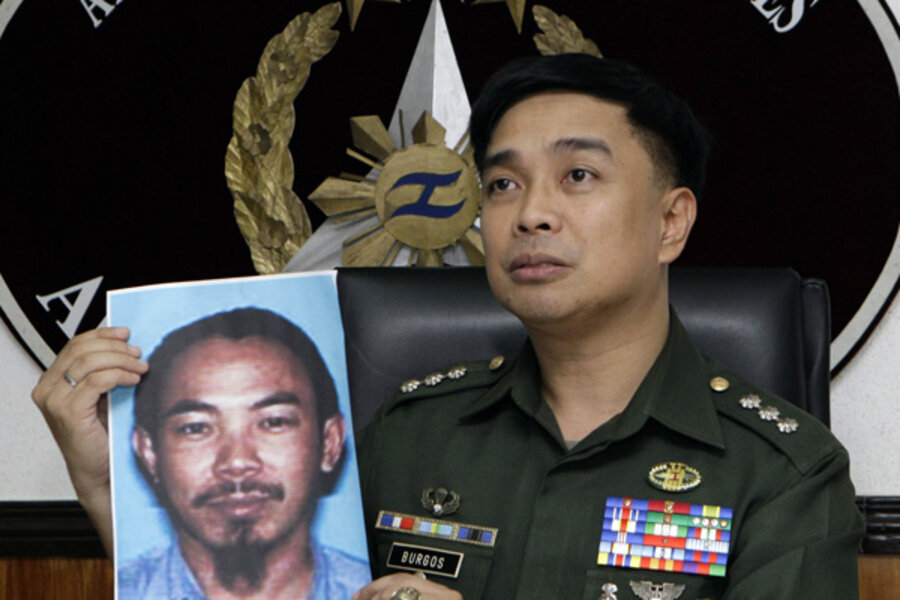Most-wanted terror leaders killed in the Philippines
Loading...
| Manila, Philippines
The Philippine military said it killed Southeast Asia's most-wanted terrorist and two other senior militants Thursday in a U.S.-backed airstrike marking one of the region's biggest anti-terrorism successes in recent years.
The dawn strike targeting a militant camp on a southern Philippine island killed Malaysian Zulkifli bin Hir, also known as Marwan, a top leader of the regional, al Qaeda-linked Jemaah Islamiyah terror network, said military spokesman Col. Marcelo Burgos.
Also killed were the leader of the Philippines-based Abu Sayyaf militants, Umbra Jumdail, and a Singaporean leader in Jemaah Islamiyah, Abdullah Ali, who used the guerrilla name Muawiyah, Burgos said.
The strike significantly weakens a regional militant network that has relied on the restive southern Philippines — sometimes called Southeast Asia's Afghanistan — as a hideout, a headquarters for planning bombings and a base for training and recruitment.
Police recovered the bodies of the three militant leaders, and they were "positively identified by police and our intelligence informants at the site," Burgos told The Associated Press. "What I know is that they will be buried."
About 30 militants were at the camp near Parang town on Jolo Island, the stronghold of the Abu Sayyaf and their allies from the mostly Indonesian-based Jemaah Islamiyah, when it was bombarded by two OV10 aircraft at 3 a.m., regional military commander Maj. Gen. Noel Coballes said.
"Our report is there were at least 15 killed, including their three leadership," he said. "This is a deliberate, fully planned attack coming from our forces."
The rest of the militants escaped and no one was captured after the attack, Coballes said.
The U.S. had offered a $5 million reward for the capture of Marwan, a U.S.-trained engineer accused of involvement in a number of deadly bombings in the Philippines and in the training of new militants.
American counterterrorism troops have helped ill-equipped Filipino troops track Marwan for years using satellite and drone surveillance. About 600 U.S. special forces troops have been deployed in the southern Philippines since 2002, providing a crucial support for the Philippines' counterterrorism operations.
Pending confirmation by DNA testing, Marwan's death represents the most important success against regional terror network Jemaah Islamiyah since the January 2011 arrest of Indonesian suspect Umar Patek in Pakistan's garrison town of Abbottabad, where Osama bin Laden was killed in a U.S. commando attack four months later.
Patek and Marwan collaborated with the Abu Sayyaf in training militants in bomb-making skills, seeking funding locally and abroad and plotting attacks, including against American troops in the southern Philippines.
Patek is believed to have traveled back to Indonesia then onward to Pakistan, leaving Marwan to take charge in the southern Philippines, military officials say.
Thursday's attack also represents a huge blow to the Abu Sayyaf's ability to recover from years of battle setbacks through fund-raising and training of new militants.
During Thursday's attack, the Philippine air force dropped four bombs weighing 500 pounds (227 kilograms) each from two bomber planes, said Maj. Gen. Jose Villarete, head of the 3rd Air Division based at an air force base in Zamboanga city.
Abu Sayyaf, the Philippine group, is behind numerous ransom kidnappings, bomb attacks and beheadings that have terrorized the Philippines for more than two decades.
U.S.-backed Philippine offensives have been credited for the capture and killing of hundreds of Abu Sayyaf fighters and most top leaders since the 1990s. Jumdail, also known as Dr. Abu, had eluded troops in numerous offensives and emerged as a key figure in the radical movement.
Most recently, all three of the militant leaders were among the prime suspects in the kidnappings of three Red Cross workers from Switzerland, Italy and the Philippines in 2009. The hostages separately regained their freedom months later, reportedly after ransom payments.
The military estimates the strength of Abu Sayyaf militants at about 400. They are still considered a key threat to the regional security.
They are believed to be holding a former Australian soldier who was kidnapped before Christmas as well as a Malaysian, a Japanese and an Indian.
On Wednesday, gunmen in nearby Tawi-Tawi island province snatched Dutch and Swiss tourists and officials said were attempting to move them to Jolo in an impoverished Muslim region (950 kilometers) south of Manila.
Get daily or weekly updates from CSMonitor.com delivered to your inbox. Sign up today.







